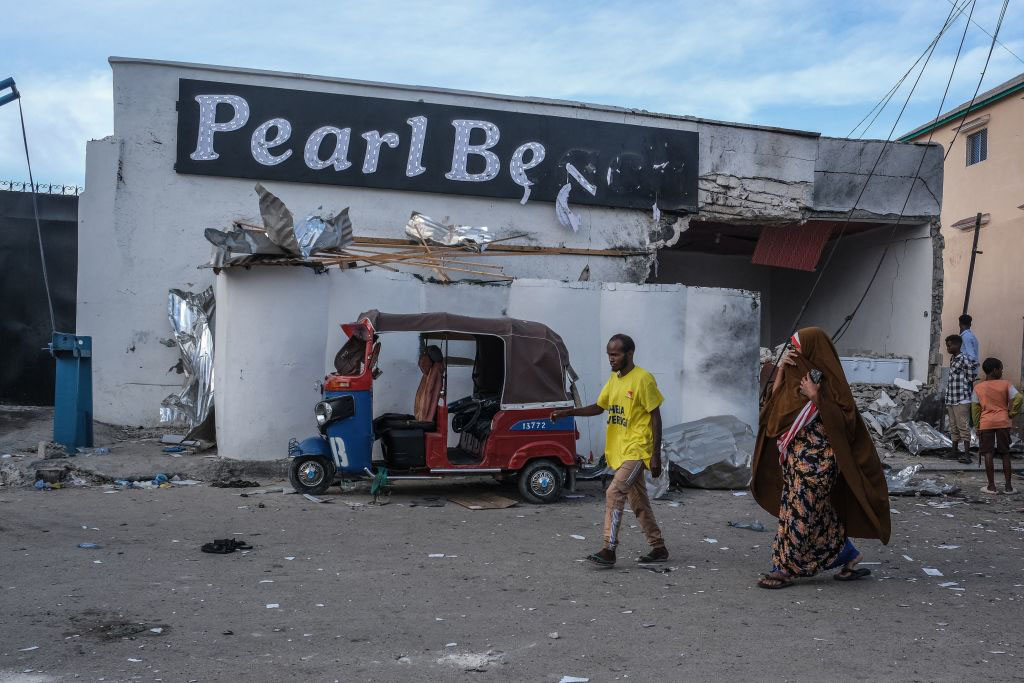ADF STAFF
Al-Shabaab claimed responsibility for an attack that killed six civilians and three Soldiers at the Pearl Beach Hotel restaurant in Mogadishu, Somalia, in early June. The attack, which started with a bomb blast and ended in gunfire, also wounded 20.
Al-Shabaab terrorists killed five civilians, including a secondary school student, in southeast Kenya in late June. The attackers also torched houses and destroyed other property.
“Women were locked in the houses and the men ordered out, where they were tied with ropes and butchered,” witness Hassan Abdul told Al-Jazeera. “All those killed were slashed and some of them had been beheaded.”
These incidents are just some of the most recent terrorist attacks committed by groups linked to al-Qaida and the Islamic State group (IS) around Sub-Saharan Africa, which counterterrorism experts say is now the world’s terrorism hot spot. Half of the victims killed by terrorist violence last year were in Sub-Saharan Africa, according to the United Nations Office on Drugs and Crime (UNODC).
Terrorism in Africa was among the subjects broached during a recent high-level U.N. conference of heads of counterterrorism agencies, including those from Interpol, the international criminal police agency; Qatar; the United States; and Google’s senior manager for strategic intelligence.
“Africa has emerged as the key battleground for terrorism, with a major increase in the number of active groups operating on the continent,” U.N. Assistant Secretary-General Khaled Khiari said in an Associated Press (AP) report.
The emergence of al-Qaida and the Islamic State group was fueled by local political, economic and social “fractures;” porous borders; and “identity-based mobilization,” Khiari added.
Justin Hustwitt, the coordinator of experts monitoring U.N. sanctions against al-Qaida and the IS, said the situation in West Africa is deteriorating as the latter group “seems to be trying to position itself as a political actor” in the region.
The Islamic State in the Greater Sahara (ISGS) exploits a lack of counterterrorism operations, especially in the tri-border area of Burkina Faso, Mali and Niger, Hustwitt said in the AP report, adding that there are “growing concerns” about the IS and al-Qaida expanding their reach to the Democratic Republic of the Congo.
Without greater international support and regional cooperation, the violence will continue spreading from the Sahel toward West Africa’s coastal countries, U.N. Assistant Secretary-General for Africa Martha Pobee said.
“Resolute advances in the fight against terrorism, violent extremism and organized crime in the Sahel desperately need to be made,” Pobee told the U.N. Security Council in May.
Pobee noted that the counterterrorism task force that addresses security in the Sahel is adjusting to a new landscape. For example, Mali left the G5 Sahel and ordered all French troops out of the country in 2022 after welcoming Russia’s Wagner Group of mercenaries into the country in late 2021.
A lack of consensus among donors and partners left the G5 Sahel Joint Force without sufficient funding and other support it needs to help stabilize the region, Pobee said in a France 24 report.
Hassane Koné, a senior researcher at the Institute for Security Studies, argued that military cooperation among countries in the Sahel should be “built without the interference of external partners, whose scope should be limited to the support requested by the countries concerned.”
“Lasting solutions will require better financing of military operations,” Koné wrote. “Equally important is coordination between these operations and governance and development interventions to deal with the root causes of the violent extremism that is destabilizing the Sahel.”
According to the U.N., violent extremist groups typically look to recruit people who feel unfairly treated by state forces or local militias, perceive the government to be corrupt, and hold grievances over land management. People in these areas feel that disputes are not resolved effectively and that judicial systems give crime victims little hope for justice.

